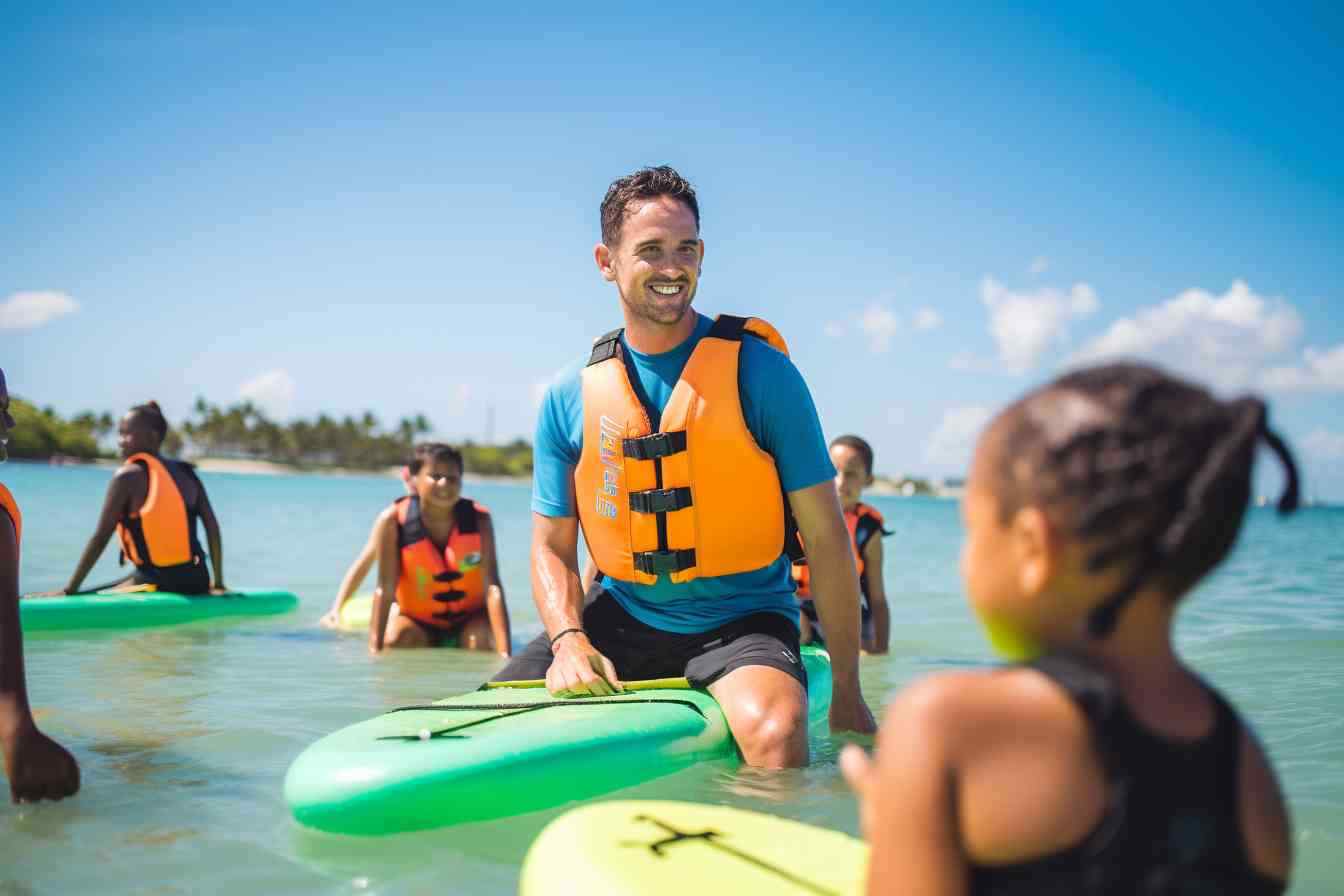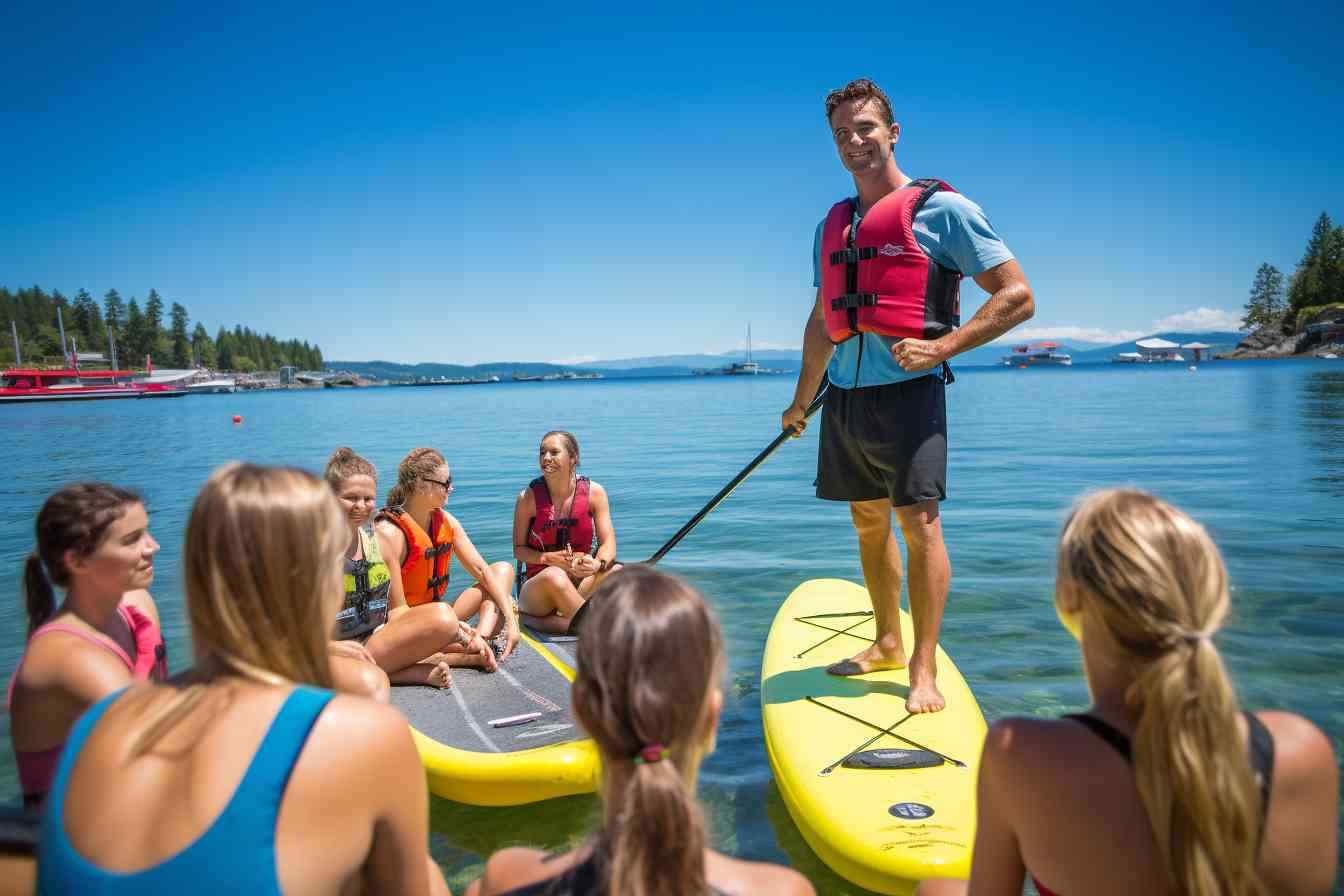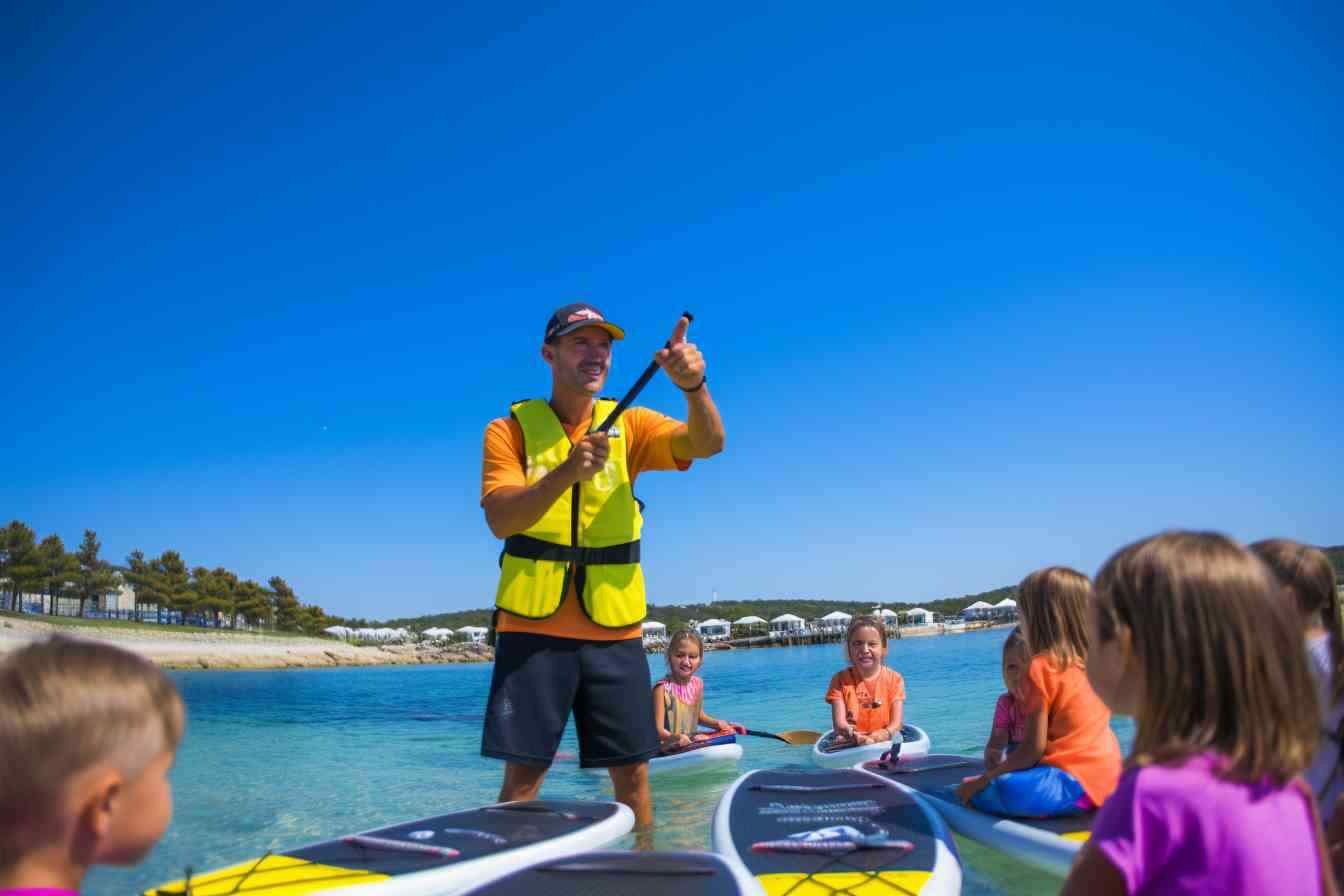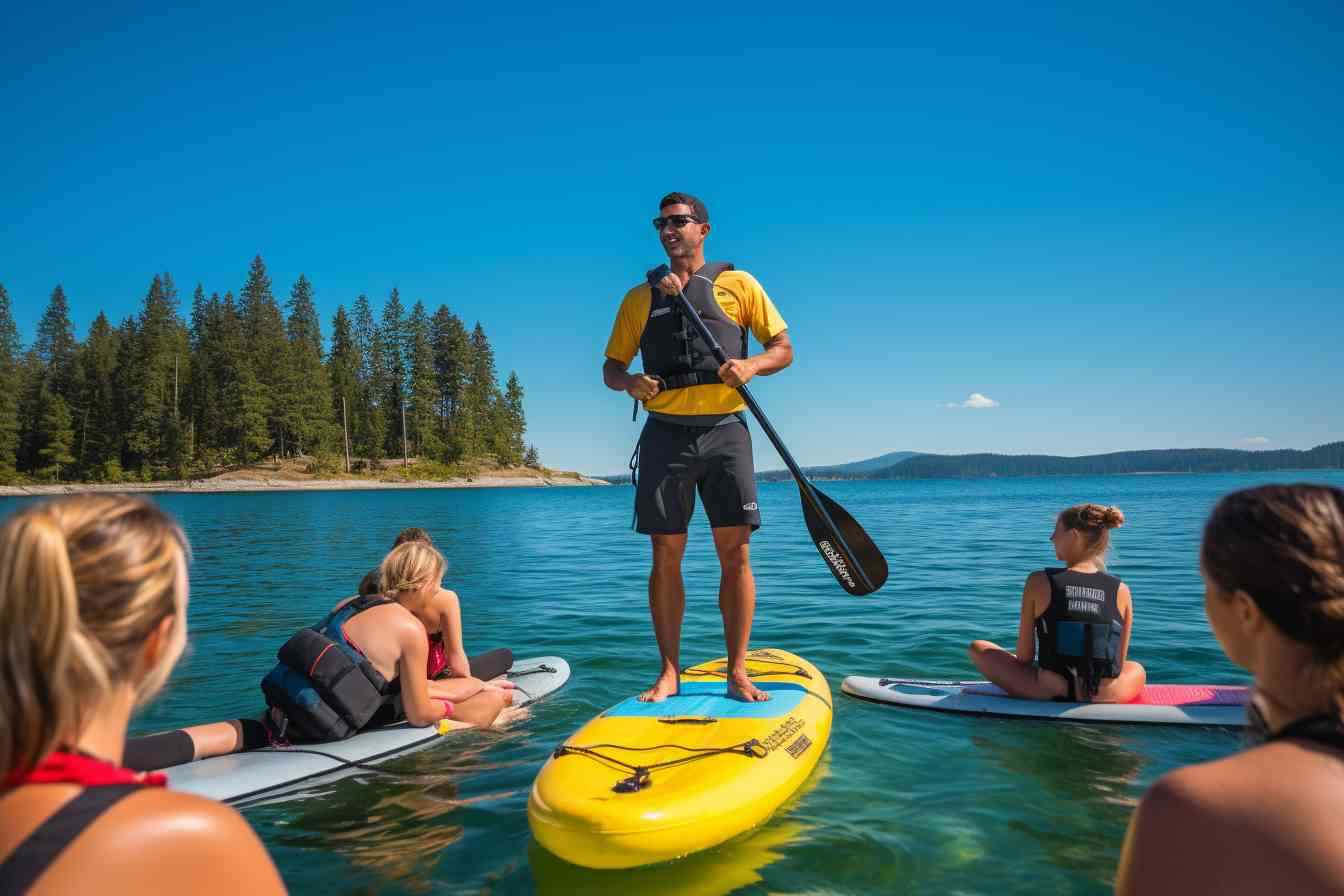Master the Art of Paddle Board Instruction A Comprehensive Guide

Summary
- Intro: Everything You Need To Know On How To Become A Paddle Board Instructor
- How Do You Teach Paddle Boarding?
- How Long Does It Take To Learn Paddle Boarding?
- How Long After A Course Does An Instructor Have To Report The Course On The Paddle Canada Course Registry?
- Can I Teach Myself To Sup?
- Final Verdict
- Frequently Asked Questions
- How do I become a paddle board instructor?
- What qualifications do I need to become a paddle board instructor?
- How long does it take to become a certified paddle board instructor?
- What does a paddle board instructor course entail?
- Do I need any specific skills or experience to become a paddle board instructor?
- Is paddle board teaching a full-time job?
- What kind of physical condition do I need to be in to be a paddle board instructor?
- Do I need insurance to be a paddle board instructor?
- Can I become a paddle board instructor if I don’t live near the sea?
- How much can I earn as a paddle board instructor?
- Related Video
- Frequently Asked Questions
Intro: Everything You Need To Know On How To Become A Paddle Board Instructor

Alrighty then, let’s dive right into the choppy waters of becoming a paddle board instructor. If you’re anything like me, your heart rate quickens just thinking about the thrill of guiding others on an adventure across the serene waterways. But, becoming a qualified paddle board instructor isn’t just a day at the beach… it involves dedication, certification, and a genuine fervor for the sport.
To kick off, you need to have a background in paddle boarding. Sound obvious? Maybe, but it’s a must to be an ace of this sport - not just someone who’s tried it once or twice. Remember, practice makes perfect, so get out there and paddle!
Certification is your next port of call. Organisations like the American Canoe Association or the Professional Stand Up Paddle Association offer comprehensive programs designed to make you a master of paddle boarding. They’ll drill you in everything from safety protocols to advanced paddling techniques. It’s rigorous, but at the end of it, the reward of being a certified paddle board instructor awaits.
And then, there’s the prerequisite of passion. This isn’t just a paycheck, folks. It’s about charting an adventure, guiding others, and immersing yourself in the world of paddle boarding. If your heart doesn’t flutter at the thought of that… well, perhaps it’s time to paddle another course.
But, if you’ve ticked all three boxes - skill, certification and passion - then my dear, you’re raring to steer the paddle board teaching vessel. Becoming an instructor isn’t just about turning a hobby into a profession. It’s about sharing the magic of paddle boarding with novices and enthusiasts alike. So, are you ready to ride the waves of this exciting opportunity? I thought so… Now, let’s get you out there on the water!
How Do You Teach Paddle Boarding?

Well, here’s the deal – teaching paddle boarding isn’t a piece of cake. It requires a deep understanding of the sport, strong communication skills, and a whole lot of patience. You don’t just jump on a board and start teaching, there are qualifications needed and a methodology to follow.
First off, you gotta understand the basics of paddle boarding – balance, paddle techniques, turning and safety measures. It’s imperative. You need to be well-versed and immersed in the nitty-gritty of paddleboarding, from understanding wind conditions to navigation techniques. Get out there on the water, practice, and experience the sport in all its glory.
Effective communication is key in teaching paddleboarding. You must be able to explain concepts clearly and simply, breaking down complex maneuvers into easy-to-understand steps. And remember, a little empathy goes a long way. Put yourself in the shoes of the learner and tailor your teaching style to their level and pace.
Safety is paramount, no two ways about it. Enforce the use of lifejackets, teach the students about water safety, rescue signals, and basic first aid. This isn’t just a suggestion – it’s a must. You’re not just teaching a sport, you’re instilling a culture of safety.
Patience is an invaluable virtue when teaching paddle boarding. Not everyone’s going to get it right off the bat and that’s completely fine! Allow students to learn, make mistakes, and grow at their own pace, while gently guiding them in the right direction.
Finally, becoming a certified paddle board instructor adds more credibility. Various organizations like the American Canoe Association (ACA) and the Professional Stand Up Paddle Association (PSUPA) offer instructor certification programs that offer in-depth training modules, and hands-on experience.
Remember, Rome wasn’t built in a day and neither will be your paddle boarding instructing skills. It’s a continuous process of learning, teaching, and growing. But believe me, the thrill of seeing your students riding those waves with confidence is totally worth it.
How Long Does It Take To Learn Paddle Boarding?

Alright, so you’re intrigued about how long it takes to acquire skills in paddle boarding, huh? Well, let me start by saying that there’s no one-size-fits-all timetable here. It’s kinda like learning to ride a bike—some might grab it in an hour, others might need a few days. But here’s the deal: the basics of balance, standing up and paddling can typically be learned within your first day.
Paddle boarding is a sport where progress depends on a lot of factors - your physical fitness, balance, and ability to adapt to water conditions. If you’re already into swimming or water sports, you’ll instantly have an upper hand. But don’t let that deter you if you’re a newbie. With regular practice—say, an hour or two a day—you can be skillfully paddling within a few weeks.
Don’t get me wrong. I’m not saying you’ll be a pro. No-siree, mastering the advanced techniques could take months or even years. And transforming yourself into an instructor? That necessitates getting certified, which means passing exams that test both your theoretic knowledge and practical skills. That can take anywhere from a few weeks to several months, depending on the certifying body and your determination.
Remember, the journey to becoming a paddle board instructor is not a sprint; it’s a marathon. So, embrace the journey, relish every wave, and don’t forget to have fun! After all, that’s what paddle boarding is all about, right?
How To Become A Paddleboard Instructor
I know you’re all bound to be interested in how one becomes a paddleboard instructor. After all, it’s a great way to turn your paddling passion into a career. Let’s dive right into the specifics.
-
First thing’s first: gaining proficiency in paddleboarding. I don’t mean just knowing how to stay afloat, but truly understanding the nuances of the sport, from the correct stances and strokes to safe water navigation and rescue techniques.
-
Following that, you’ll need to gain professional certification. The PaddleFit and American Canoe Association are among the notable organizations that offer leveled certifications for aspiring instructors.
-
On top of your certified skills, you’ll also need to have first aid and CPR knowledge – often requiring separate certification. Remember, as an instructor, you’re responsible for the safety of your students.
-
Building up experience over time is a must. You can’t expect to become an instructor right after certification. Get a job as a paddle board assistant or volunteer for training programs to enhance your practical skills and knowledge.
-
You should also develop strong swimming skills. I mean, we’re talking about a water sport here, folks! You need to be capable of rescuing a student if they fall in or encounter problems.
-
Be ready for the physical demands of the job: this isn’t a career for those unwilling to stay in shape. Paddleboarding is a full-body workout and you’ll need to maintain a high level of fitness.
-
Last but not least, learn to be patient and communicate effectively. As an instructor, you’ll be catering to learners of varying skill levels. Patience and clear instructions are key to helping them master paddleboarding.
You see, becoming a paddleboard instructor is more than just being a good paddler. It’s a commitment to the sport, to safety, to teaching others. But for those of you who thrive in the great outdoors and have a knack for teaching, it’s a rewarding career choice!
How Long After A Course Does An Instructor Have To Report The Course On The Paddle Canada Course Registry?

Ah, you want to know the timeline for reporting your course to the Paddle Canada course registry, huh? That’s a critical piece of the puzzle in becoming a nifty paddle board instructor. Well, let me lay it out for you. After you have successfully completed a course as a paddle board instructor, the clock starts ticking.
You’ve got a tight window – approximately 30 days to be exact – post-completion of your course, to report your achievement to the Paddle Canada course registry. Yes, my friend, that’s right – just four weeks to dot the i’s and cross the t’s on this part of your journey. But remember, these aren’t concrete shoes– the 30-day limit encourages timely reporting, but it’s not a hard fast rule. If for some reasons you miss this window, don’t be disheartened. You still can report your course but you might have to pay a late fee, which is not somethin’ anyone particularly enjoys.
Make sure to have all your ducks in a row beforehand – your course details, the date you completed the course, and other relevant info. This way, you’ll be ready to strike while the iron is hot and get your course reported as swiftly as possible. You may be thinking, “Can I not just kick back and let the organization report this for me?” I hate to be the bearer of bad news, but the responsibility lies with you, the newly minted instructor.
So, there you have it! A bite-sized guide to reporting your course on the Paddle Canada course registry. Remember, promptly reporting your course not only keeps you on the straight and narrow, but it also allows you to start paddling full steam ahead in your paddle board instructor career.
Can I Teach Myself To Sup?
Well, let’s dive right in, shall we? So, you’re wondering, “” and the answer is a resounding yes! Stand-Up Paddleboarding (SUP) is not only a great workout but also an amazing way to connect with nature and enjoy the open water. But what if you want to take your passion a notch higher and become an instructor?
Well, nothing’s stopping you, my friend. While it’s completely feasible to teach yourself SUP, becoming an instructor will require a bit more commitment. You need to have a good grasp of primary skills such as balancing, steering, stopping, and rescuing – all of which you can learn by yourself with enough practice.
However, getting certified as an instructor involves learning advanced skills that, quite honestly, are best taught by experienced professionals. Take my word, it’s a good idea to seek formal training to ensure you’re equipped to handle any potential challenges. Yes, figuring it out on your own exciting but also safety matters!
Moreover, there’s always the option of participating in a certification program. Let’s call a spade a spade! While it’s not a piece of cake and it involves a signficant investment of time and money, it’s certainly worth it if you’re serious about pursuing this as a career. Remember, “A smooth sea never made a skillful sailor.” So, gear up to ride the waves of challenges coming your way.
Don’t forget, equally important is knowing how to impart these skills to others. After all, you’re not just looking to SUP for fun – you want to be a skilled instructor. Hence, developing teaching and communication skills is key. So, can you teach yourself to SUP? Absolutely! But becoming an instructor might require a tad more guidance. Stay stoked and paddle on!
Final Verdict
Alright, we’ve finally come to the tail-end of this journey - the “final verdict”. I gotta level with you. So, you want to become a paddle board instructor, huh? To put it in simple terms, it is a rewarding yet demanding profession. There’s just something about sharing your passion with others, watching them get the hang of balancing on the board, catching their first wave…
But, whoa, slow your roll there, it’s not a walk in the park. The giggles and adrenaline rushes are jus one half of it, sure, but there’s also responsibility, knowledge and a real commitment on your end. You’ll need to have a good grasp on teaching techniques, first aid knowledge and be at the top of the game in terms of physical fitness.
And here’s a tidbit no one usually tells you - the learning never stops. Each day is a new day in the water, new challenges, new encounters. It keeps you on your toes - or rather, your board. The challenges? They’re part of the thrill. Getting your qualifications, maintaining fitness, and constantly improving are all par for the course.
Yet, ultimately, the payoff is great. Immersing yourself amongst like-minded people, the joy of teaching, the thrill of the big blue sea - it’s a choose-your-own-adventure like nothing else.
So, the final verdict? If you’re passionate about paddle boarding, keen on teaching and have a love for the water, this might just be the career that you’re destined for. It’s a ride, for sure, but isn’t all the best things in life? So go on, grab your paddle board, and take the plunge. The wave of opportunity is waiting for your leap. Just remember - paddle steadily and always have your life vest on. Safety first!
Frequently Asked Questions
How do I become a paddle board instructor?
Becoming a paddle board instructor requires specific training. You typically need to participate in a certification course through recognized bodies like Paddle Canada or the American Canoe Association. These courses encompass both practical and theoretical learning, including safety procedures, effective teaching methods, and advanced paddleboarding techniques.
What qualifications do I need to become a paddle board instructor?
You’ll need a certification from a reputable training provider. Most organizations require CPR and first aid qualifications, too. Remember, your training course should cover all paddleboarding aspects, including safety, instruction techniques, and paddle skills, so you’ll be fully equipped to coach others.
How long does it take to become a certified paddle board instructor?
Typically, training can take anywhere from a few days to several weeks, depending on the program’s intensity and your existing skill level. Be ready to invest time and energy into your training.
What does a paddle board instructor course entail?
A comprehensive paddle board instructor course should cover safety protocols, rescue techniques, effective communication skills, lesson planning, paddleboard equipment knowledge, and advanced paddle techniques. You’ll also learn how to cater to students of various skill levels and needs which is critical for teaching.
Do I need any specific skills or experience to become a paddle board instructor?
Before you can instruct others, you’ll first need to be a proficient paddler yourself. Most certifying bodies would like you to have strong swimming skills, and many prefer experience in teaching or coaching.
Is paddle board teaching a full-time job?
It can be, but often it’s seasonal or part-time, depending on your location and the demand for classes. Many instructors supplement their income with other jobs or teach paddle boarding as a side gig. But hey, if you’re passionate about it, why not aim for full-time?
What kind of physical condition do I need to be in to be a paddle board instructor?
You need to be in good shape both for your safety and your students’. This means strong swimming and paddling skills, as well as stamina and resilience. But, keep in mind, this job is about teaching and coaching skills, not who can paddle the fastest.
Do I need insurance to be a paddle board instructor?
Absolutely! You’ll need the appropriate insurance to cover you and your students. Shop around for insurance providers who specialize in outdoor sports and understand the specific needs of paddleboard instructors.
Can I become a paddle board instructor if I don’t live near the sea?
Sure! Paddleboarding isn’t just a sea sport – it’s done on rivers and lakes too. As long as you have access to safe, suitable water, you can teach paddleboarding.
How much can I earn as a paddle board instructor?
Your income as an instructor can vary based on your location, how often you teach, the season, and your level of expertise. It can range anywhere from $20 to $50 per hour for group classes. Private lessons can bring in more.


Comments